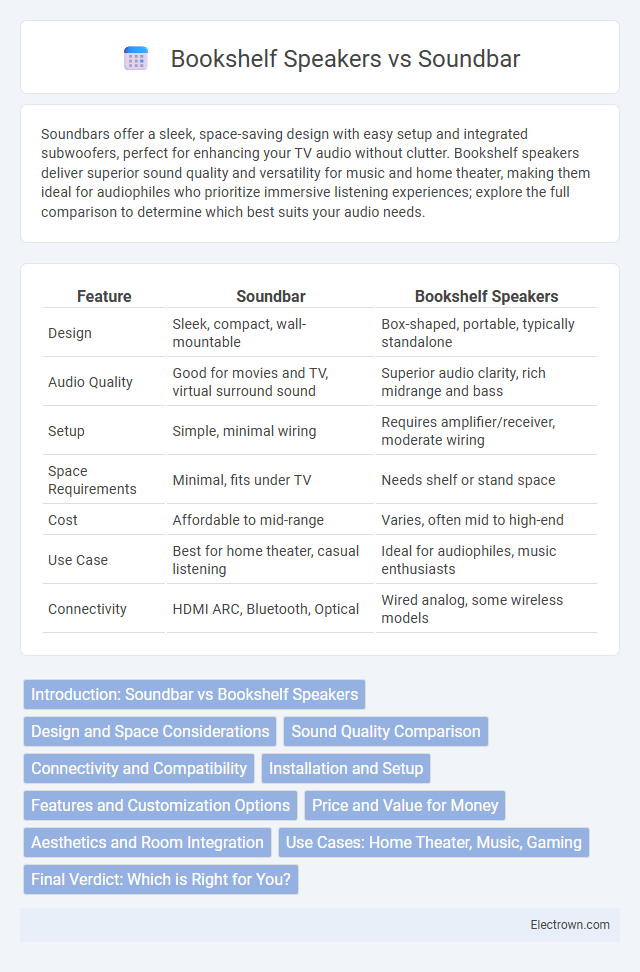Soundbars offer a sleek, space-saving design with easy setup and integrated subwoofers, perfect for enhancing your TV audio without clutter. Bookshelf speakers deliver superior sound quality and versatility for music and home theater, making them ideal for audiophiles who prioritize immersive listening experiences; explore the full comparison to determine which best suits your audio needs.
Table of Comparison
| Feature | Soundbar | Bookshelf Speakers |
|---|---|---|
| Design | Sleek, compact, wall-mountable | Box-shaped, portable, typically standalone |
| Audio Quality | Good for movies and TV, virtual surround sound | Superior audio clarity, rich midrange and bass |
| Setup | Simple, minimal wiring | Requires amplifier/receiver, moderate wiring |
| Space Requirements | Minimal, fits under TV | Needs shelf or stand space |
| Cost | Affordable to mid-range | Varies, often mid to high-end |
| Use Case | Best for home theater, casual listening | Ideal for audiophiles, music enthusiasts |
| Connectivity | HDMI ARC, Bluetooth, Optical | Wired analog, some wireless models |
Introduction: Soundbar vs Bookshelf Speakers
Soundbars offer sleek, space-saving designs with integrated amplification and multiple drivers for immersive surround sound, making them ideal for enhancing TV audio without clutter. Bookshelf speakers deliver superior audio fidelity and dynamic range powered by dedicated amplifiers, providing richer sound quality for music enthusiasts and home theater setups. Your choice depends on room size, audio preferences, and aesthetic priorities, balancing convenience with acoustic performance.
Design and Space Considerations
Soundbars feature a sleek, compact design that fits seamlessly below televisions, ideal for limited spaces and minimalist setups. Bookshelf speakers require dedicated stands or shelving, demanding more room but offering flexibility in placement for optimal sound staging. Choosing between the two depends on available space, aesthetic preferences, and how much room is allocated to audio equipment.
Sound Quality Comparison
Bookshelf speakers generally deliver superior sound quality with richer, more detailed audio and a wider soundstage due to larger drivers and dedicated components. Soundbars prioritize space-saving design and convenience but often struggle to match the dynamic range and bass depth found in bookshelf speaker setups. For audiophiles seeking immersive, high-fidelity sound, bookshelf speakers remain the preferred choice over most soundbars.
Connectivity and Compatibility
Soundbars typically offer versatile connectivity options, including HDMI ARC, optical, and Bluetooth, making them compatible with a wide range of TVs and streaming devices. Bookshelf speakers often require an external amplifier or receiver and usually connect via wired speaker cables, which may limit direct compatibility with modern smart devices. Your choice should consider how seamlessly the speaker setup integrates with your existing entertainment system and preferred content sources.
Installation and Setup
Soundbars offer a streamlined installation process with minimal wiring and easy placement, often requiring just a single connection to the TV via HDMI ARC or optical cable. Bookshelf speakers typically demand more setup effort, including positioning for optimal acoustics, wiring to an amplifier or receiver, and calibration for sound balance. Soundbars are ideal for users seeking quick, space-saving solutions, whereas bookshelf speakers cater to audiophiles prioritizing customizable sound configurations.
Features and Customization Options
Soundbars offer sleek, all-in-one audio solutions with built-in wireless connectivity, virtual surround sound, and easy setup, making them ideal for limited space and convenience. Bookshelf speakers provide superior audio fidelity with larger drivers, separate amplifiers, and extensive customization options, allowing audiophiles to tailor sound profiles through external receivers and room calibration. Your choice depends on whether you prioritize compact design and simplicity or advanced sound customization and quality.
Price and Value for Money
Soundbars generally offer a more affordable entry point for enhancing TV audio, with prices often ranging from $100 to $500, providing a compact, all-in-one solution ideal for budget-conscious buyers. Bookshelf speakers, priced between $150 and $1000 or more, deliver superior sound quality and versatility but usually require additional equipment like an amplifier, increasing overall cost and complexity. For those prioritizing value for money, soundbars maximize convenience and decent audio performance, while bookshelf speakers offer better long-term investment in high-fidelity sound.
Aesthetics and Room Integration
Soundbars offer a sleek, minimalist design that seamlessly integrates with modern living rooms, often mounted below TVs for a clutter-free look. Bookshelf speakers provide a classic aesthetic with versatile placement options, enhancing room acoustics but potentially requiring additional space and stands. Both options impact room decor differently, balancing between visual appeal and spatial needs.
Use Cases: Home Theater, Music, Gaming
Soundbars offer a sleek, space-saving solution ideal for enhancing home theater experiences with immersive surround sound and clear dialogue, while bookshelf speakers provide superior audio fidelity for music enthusiasts seeking detailed and dynamic sound reproduction. For gaming, bookshelf speakers deliver precise positional audio that enhances spatial awareness, whereas soundbars offer convenience and integrated features like voice control and easy setup. Choosing between them depends on the priority of audio quality versus compact design for specific use cases such as home theater immersion, high-fidelity music playback, or immersive gaming environments.
Final Verdict: Which is Right for You?
Soundbars provide an all-in-one, space-saving audio solution ideal for small rooms and easy setup, while bookshelf speakers deliver superior sound quality and dynamic range for audiophiles prioritizing immersive listening experiences. Consider your room size, budget, and usage preferences: soundbars excel in convenience and integrated features, whereas bookshelf speakers offer upgrade potential and more precise sound reproduction. Choosing between them depends on whether you value simplicity and compact design or enhanced audio fidelity and customization.
Soundbar vs Bookshelf Speakers Infographic

 electrown.com
electrown.com